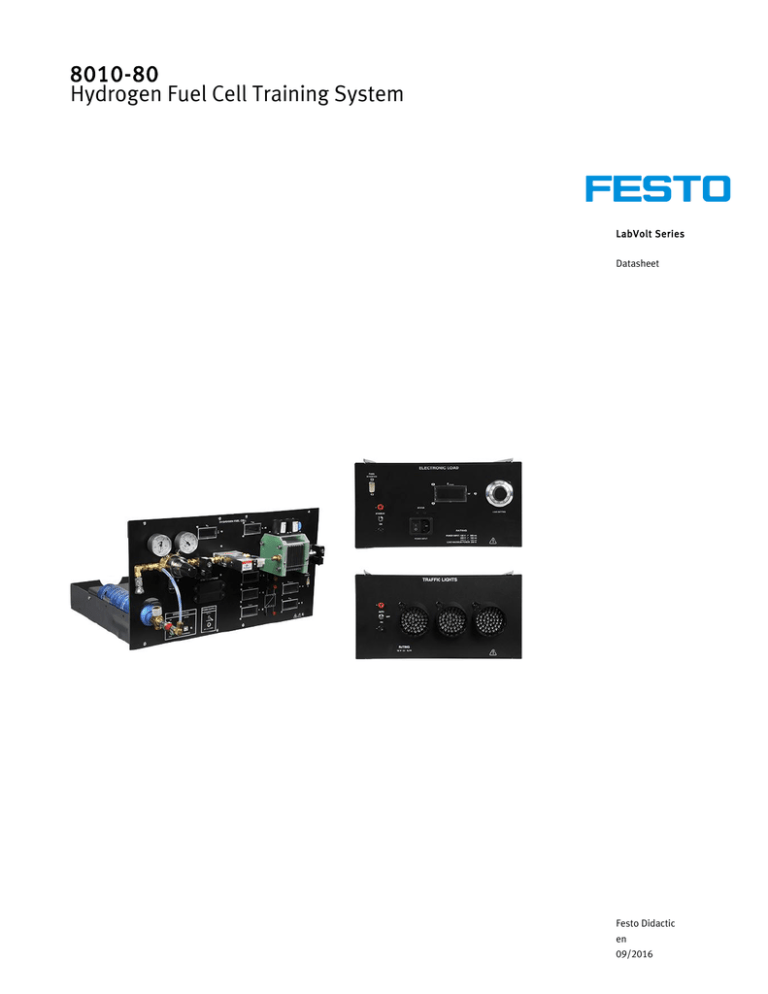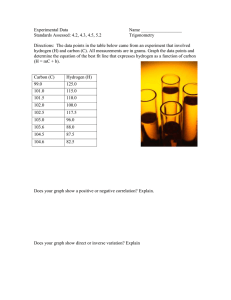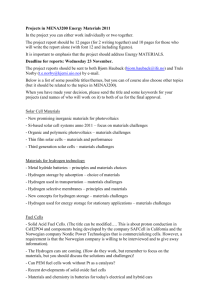
8010-80
Hydrogen Fuel Cell Training System
LabVolt Series
Datasheet
Festo Didactic
en
09/2016
Hydrogen Fuel Cell Training System, LabVolt Series, 8010-80
Table of Contents
General Description _______________________________________________________________________2
Exercises________________________________________________________________________________3
Features & Benefits _______________________________________________________________________3
List of Equipment_________________________________________________________________________4
List of Manuals___________________________________________________________________________4
Table of Contents of the Manual(s) __________________________________________________________4
Additional Equipment Required to Perform the Exercises ________________________________________7
Optional Equipment_______________________________________________________________________7
Optional Manual(s) _______________________________________________________________________7
System Specifications _____________________________________________________________________7
Equipment Description ____________________________________________________________________8
Optional Equipment Description __________________________________________________________ 1 2
General Description
The Hydrogen Fuel Cell Training System provides a realistic representation of the basic functions of a 50 W
hydrogen fuel cell system. It is ideal for teaching the basic engineering principles of fuel cell systems. Realistic,
extensive experimenting capabilities and optimized instructional materials make this a comprehensive
instruction package. Through practical experiments, students acquire a sound competence in working with fuel
cell systems.
The modular design of the Hydrogen Fuel Cell Training System enables flexibility in setup complexity – from
simple experiments for teaching basic principles to complex experiments for experienced students. The
components and curriculum of the Hydrogen Fuel Cell Training System are offered through a partnership with
Heliocentris, the world’s leading authority on fuel cells used in education. The system is suitable for hands-on
learning in diverse fields of study and occupations, such as:
•
•
•
•
•
Electrical engineering
Energy engineering
Process engineering
Mechanical engineering
Automotive engineering
The Hydrogen Fuel Cell Training System includes numerous prepared experiments, enabling students to
examine the design and functions of a real fuel cell system. It is developed especially for educational purposes,
the system being designed for maximum safety and ease of use, even by inexperienced users. With this training
system, students explore the engineering principles of a hydrogen fuel cell system, as well as advanced general
principles related to the system, including:
•
•
•
•
Structure and functioning principles
Thermodynamics
Characteristic curves and efficiency ratings
Power electronics
The Hydrogen Fuel Cell Training System is part of the Electric Power Technology Training Systems, Series 8010.
Each training system in Series 8010 is based on the Electric Power Technology Training Program and provides a
turn-key solution dealing with some aspects of the wide field of electrical energy. The exhaustive courseware
2
© Festo Didactic
Hydrogen Fuel Cell Training System, LabVolt Series, 8010-80
provided with each training system covers all the theory required to perform the laboratory exercises, while
review questions and unit tests allow students to test the knowledge they have gained.
The Electric Power Technology Training Program is highly modular in both courseware and hardware. Because
of this, courses and equipment from the program are available as required, either individually or in the context
of a specific training system. The program covers several different subjects in the field of electrical energy, such
as rotating machines, electrical power transmission, power electronics, home energy production from
renewable resources (wind and sunlight), large-scale electricity production from hydropower and wind power,
smart-grid technologies (SVC, STATCOM, HVDC transmission, etc.), storage of electrical energy in batteries, and
drive systems for small electric vehicles and cars.
Exercises
Theory:
•
•
•
•
•
Introduction to the operation of a fuel cell system
Characteristic curve and output curve of the fuel cell
Dependence of output on air supply and temperature
Hydrogen/current characteristic curve of the fuel cell
Efficiency analyses of the fuel cell stack
Safety:
The Hydrogen Fuel Cell Training System is designed for maximum technical safety. Developed especially for
universities and vocational institutions, the system is designed for safe and easy operation by inexperienced
and experienced users. In case of overloads or irregularities, the trainer shuts down automatically and locks the
hydrogen supply. Therefore, you can take the system to its limits without the risk of safety hazards or damage.
Practice:
•
•
•
•
Set-up and operation of an autonomous power supply
Efficiency of the fuel cell system
Sample application of independent power supply: How long can a fuel cell supply an autonomous consumer?
Sample application for fuel cell car: Determination of the fuel consumption based on the load profi le
Features & Benefits
•
•
•
•
•
•
Different test points with digital meters throughout the process for better understanding
The training system teaches the principles of hydrogen fuel cell operation during both charge and discharge directly
in the laboratory.
The hydrogen fuel cell modules are safe to use and present no risk to system users. The modules are easy to setup
by following the procedure detailed in the manuals.
Sequential loads and fully adjustable loads allow study of hydrogen fuel cell system operation.
A variety of test points with digital meters are included in the hydrogen fuel cell modules to observe the different
processes taking place.
The course curriculum of the Electric Power Technology Training Program is highly flexible and allows a multitude of
different customized training solutions.
© Festo Didactic
3
Hydrogen Fuel Cell Training System, LabVolt Series, 8010-80
•
The courseware includes student manuals and instructor guides with all the theory required to perform the hands-on
experiments.
All workstations, modules, and components are very sturdy to ensure a prolonged service life in a demanding
environment such as a training laboratory.
The modular design approach of the training equipment allows a large variety of courses to be performed using a
small number of modules, without unnecessary duplication of equipment.
All electrical components can be interconnected without electric shock hazard since all live parts of the connection
leads are concealed and insulated.
All electrical symbols representing the components used in a laboratory exercise are clearly silk-screened on the
front panel of the modules.
•
•
•
•
List of Equipment
Model
number
Three-Module Workstation _______________________________________________________________ 8131-00
Traffic Lights __________________________________________________________________________ 8380-00
Electronic Load ________________________________________________________________________ 8381-00
Hydrogen Fuel Cell _____________________________________________________________________ 8803-00
Hydrogen Cylinder Connection Kit ________________________________________________________ 52863-00
Hydrogen Storage Canister ______________________________________________________________ 87948-00
Qty Description
1
1
1
1
1
1
List of Manuals
Manual
number
Electric Power Technology Training Equipment (User Guide) ______________________________________ 38486-E0
Hydrogen Fuel Cell (Student Manual) _________________________________________________________ 86355-00
Hydrogen Fuel Cell (Instructor Guide) _________________________________________________________ 86355-10
Hydrogen Fuel Cell (User Guide) _____________________________________________________________ 86355-E0
Description
Table of Contents of the Manual(s)
Electric Power Technology Training Equipment (User Guide) (38486-E0)
•
1 General Safety Recommendations
•
2 System Power Requirements
•
3 Quick Start Installation Guide
•
4 Equipment Installation
•
5 Modules Handling, Installation, and Removal
•
6 Equipment Maintenance
•
A Connection of the Power Supply to the AC Power Network
•
B Description, Specifications, and Operation of the EMS Modules
Hydrogen Fuel Cell (Student Manual) (86355-00)
•
1 Operating References
•
1.1 Warnings and safety references
•
1.2 Product overview
•
1.3 Fuel Cell Module FC50
•
1.4 Electronic Load Module EL200
•
1.5 Voltage Converter Module VC100
4
© Festo Didactic
Hydrogen Fuel Cell Training System, LabVolt Series, 8010-80
•
•
•
•
•
•
•
•
•
•
•
•
•
•
•
•
•
•
•
•
1.6 Traffic Light Module TL10
1.7 Control software
1.8 Hydrogen supply option I: Connection set for compressed hydrogen cylinders
1.9 Hydrogen supply option II: Metal hydride storage with refilling kit
1.10 Hydrogen supply option III: Hydrogen generator with metal hydride storage
2 Technical basics and didactics
2.1 Learning objectives
2.2 Teaching references and methodology
2.3 Recommended web sites
2.4 References for further reading
3 Student experiments
3.1 The basic functions of the fuel cell system
3.2 The characteristic curve of a fuel cell
3.3 Parameters influencing the characteristic curve
3.4 Determination of the hydrogen current curve
3.5 Efficiency of the fuel cell stack
3.6 Set-up of a fuel cell power supply
3.7 Efficiency of a fuel cell power supply
3.8 Fuel cell application I: Remote traffic light
3.9 Fuel cell application II: Fuel cell car
Hydrogen Fuel Cell (User Guide) (86355-E0)
•
1 Warnings and Safety Instructions
•
1-1 Restricted use
•
1-2 Sources of danger
•
1-3 Authorized operators
•
1-4 Workplace
•
1-5 Safety information about using hydrogen
•
1-6 Safety precautions in an emergency
•
2 Product overview
•
2-1 Basic package
•
2-2 Off-grid package
•
3 Fuel Cell Module FC50
•
3-1 Use
•
3-2 Overview and parts list
•
3-3 Basic functions
•
3-4 Technical data
•
3-5 Hydrogen source
•
3-6 Start-up
•
3-7 Shutting down
•
3-8 Factors affecting operation
•
3-9 Improper modes of operation
•
3-10 Error messages and causes
•
3-11 Maintenance
•
4 Electronic Load Module EL200
•
4-1 Use
•
4-2 Overview and parts list
© Festo Didactic
5
Hydrogen Fuel Cell Training System, LabVolt Series, 8010-80
•
•
•
•
•
•
•
•
•
•
•
•
•
•
•
•
•
•
•
•
•
•
•
•
•
•
•
•
•
•
•
•
•
•
•
•
•
•
•
•
•
•
•
•
•
•
•
6
4-3 Basic function
4-4 Technical data
4-5 Start-up
4-6 Manual operation
4-7 Computer-assisted operation
4-8 Shutting down
4-9 Improper modes of operation
4-10 Possible malfunctions
5 Voltage Converter Module VC100
5-1 Use
5-2 Overview and parts list
5-3 Basic functions
5-4 Technical data
5-5 Start-up
5-6 Maintenance
6 Traffic Light Module TL10
6-1 Use
6-2 Overview
6-3 Technical data
7 Control software
7-1 System requirements
7-2 Installation
7-3 Running an FC50 Program
7-4 Control window (left side)
7-5 Warm-up panel
7-6 User Interface program
7-7 Experiment programs
7-8 Automated Experiment programs
7-9 Troubleshooting
8 Hydrogen Supply I: Connection set for compressed gas cylinders
8-1 Use
8-2 Overview and parts list
8-3 Special safety considerations for handling compressed hydrogen cylinders
8-4 Technical data
8-5 Basic function
8-6 Installation
8-7 Pausing and shutting down
8-8 Maintenance and repair
9 Hydrogen Supply II: Metal hydride storage, with refilling kit
9-1 Use
9-2 Overview and parts list
9-3 Special safety considerations for metal hydride storage canisters
9-4 Special safety considerations for handling compressed hydrogen cylinders
9-5 In case of fire
9-6 Technical data
9-7 Basic function
9-8 Shipping state, installation and first use of the metal hydride canister
© Festo Didactic
Hydrogen Fuel Cell Training System, LabVolt Series, 8010-80
•
•
•
•
•
•
•
•
•
•
9-9 Refilling the metal hydride storage canister with hydrogen
9-10 Installation of the metal hydride storage canister on its panel
9-11 Using hydrogen from the metal hydride storage canister
9-12 Pausing and shutting down
9-13 Maintenance and repair
10 Hydrogen Supply III: Hydrogen generator with metal hydride storage
10-1 Use
10-2 Special safety considerations for the hydrogen generator
10-3 Overview, scope of supply and operation
11 Warranty and complaints
Additional Equipment Required to Perform the Exercises
Model
number
Training on Hydrogen Fuel Cell, 0.6 day ___________________________________________________ 86355-TF 1
Qty Description
1
Optional Equipment
Model
number
Storage Shelves _______________________________________________________________________ 8150-10
Hydrogen Generator ____________________________________________________________________ 8894-00
Installation and Commissioning of a 8010-1 System _________________________________________ 80101-IC 2
Qty Description
1
1
1
Optional Manual(s)
Model
number
Manuals on CD-ROM – Hydrogen Fuel Cell Training System (Student Manual) ____________________ 86355-A0
Qty Description
1
System Specifications
Parameter
Value
Power Requirements
Service Installation
A standard single-phase ac outlet
Physical Characteristics
Intended Location
On a table able to support the weight of the workstation and installed equipment
Dimensions (H x W x D)
900 x 930 x 530 mm (35.4 x 36.6 x 20.9 in)
Net Weight
TBE
EMS Modules
Full-Size Dimensions (H x W x D)
308 x 287 x 440 mm (12.1 x 11.3 x 17.3 in)
Half-Size Dimensions (H x W x D)
154 x 287 x 440 mm (6.1 x 11.3 x 17.3 in)
1 Optional training at Festo Didactic (Canada or USA). For details or other options, contact "training.didactic.ca@festo.com".
2 Installation and basic commissioning of the equipment in your classroom. Installer fees (flight, accommodation...) must be added to the price. The
product (box(es) and/or pallet(s)) must already be in the classroom or extra charges will apply. For details or other options, contact
"training.didactic.ca@festo.com".
© Festo Didactic
7
Hydrogen Fuel Cell Training System, LabVolt Series, 8010-80
Equipment Description
Three-Module Workstation
8131-00
The Three-Module Workstation is a
fully assembled workstation that
serves the same purpose as the
Mobile Workstation, Model 8110, but
without any storage cabinet or pull-out
work surface. This workstation is
intended for use on a bench (not
supplied) and is fitted with wooden
feet to protect the bench top.
The Three-Module Workstation consists of a single row of three full-height compartments that can
accommodate up to three full-size EMS modules or six half-size EMS modules.
Module Installation
The EMS modules are guided into position along stainless steel guide rails. Separators between each bay of the
workstation ensure perfect alignment of the EMS modules and allow their easy insertion in the workstation. A
holding mechanism ensures that each EMS module stays in place once it is installed in a compartment of the
workstation. A front-mounted push lever allows all EMS modules on the workstation to be released for easy
removal.
Safety Padlock Bars
Two safety padlock bars on the front of the workstation prevent students from removing EMS modules during
laboratory exercises. The bars can be removed and locked to the side of the workstation when the safety lock is
not necessary.
8
© Festo Didactic
Hydrogen Fuel Cell Training System, LabVolt Series, 8010-80
Additional Information
Three holes in the rear panel of the workstation allow connection to a power supply, as well as the connection
of 2 kW machines to their interconnection modules. Assembly of the workstation before painting ensures that
each EMS module in the workstation is correctly grounded.
Manual
Manual
number
Electric Power Technology Training Equipment (User Guide) ______________________________________ 38486-E0
Description
Table of Contents of the Manual(s)
Electric Power Technology Training Equipment (User Guide) (38486-E0)
•
1 General Safety Recommendations
•
2 System Power Requirements
•
3 Quick Start Installation Guide
•
4 Equipment Installation
•
5 Modules Handling, Installation, and Removal
•
6 Equipment Maintenance
•
A Connection of the Power Supply to the AC Power Network
•
B Description, Specifications, and Operation of the EMS Modules
Optional Equipment
Model
number
Industrial Controls Single-Rail Workstation ________________________________________________ 3105-A0 3
Industrial Controls Double-Rail Workstation ________________________________________________ 3105-B0 4
Dust Cover for Workstation 8131 __________________________________________________________ 8991-10
Qty Description
1
1
1
Specifications
Parameter
Value
Physical Characteristics
Intended Location
On a table able to support the weight of the workstation and installed equipment
3 This add-on workstation allows modules from the Industrial Controls Training Systems, Models 8036, to be installed in the EMS workstation. Refer
to the 8036 datasheet for more information.
4 This add-on workstation allows modules from the Industrial Controls Training Systems, Models 8036, to be installed in the EMS workstation. Refer
to the 8036 datasheet for more information.
© Festo Didactic
9
Hydrogen Fuel Cell Training System, LabVolt Series, 8010-80
Parameter
Value
Dimensions (H x W x D)
375 x 930 x 530 mm (14.8 x 36.6 x 20.9 in)
Net Weight
TBE
Traffic Lights
8380-00
The Traffic Lights module simulates a
real-world traffic light application that
can be used as a load for a fuel cell
system.
Specifications
Parameter
Value
Input Voltage
12 V dc
Power Consumption Max.
10 W
Physical Characteristics
Dimensions (H x W x D)
154 x 287 x 440 mm (6.1 x 11.3 x 17.3 in)
Net Weight
TBE
Electronic Load
8381-00
The Electronic Load provides manual
or computer-assisted adjustment of
constant rated currents that can be
used to record the characteristic
curves of a fuel cell system, allowing
users to monitor the effects of
different parameters.
Specifications
Parameter
Value
Maximum continuous power output
200 W
Load voltage
1.2 – 20 V dc
Load current
0 – 10 A
Mains connection
120 – 240 V (50 – 60 Hz)
Physical Characteristics
10
Dimensions (H x W x D)
154 x 287 x 440 mm (6.1 x 11.3 x 17.3 in)
Net Weight
TBE
© Festo Didactic
Hydrogen Fuel Cell Training System, LabVolt Series, 8010-80
Hydrogen Fuel Cell
8803-00
The Hydrogen Fuel Cell module is a
fuel cell stack comprising a fuel cell
controller, a hydrogen flow meter, a
dc-to-dc converter (required to obtain
a regulated dc output from the fuel cell
stack), an air supply, and seven LED
displays for visualizing all essential
system parameters (e.g., current,
voltage, temperature, fuel, air supply).
A USB port on the front panel enables use of the included data acquisition software to perform further analysis
on the fuel cell stack. This software provides support for the experiments (visualization, data logging, fully
automated experiments) in the manual.
Specifications
Parameter
Value
Rated Output
40 W
Maximum Output
50 W
No-Load Voltage
9V
Current at Rated Output
8A
Hydrogen Consumption at Rated Output
580 sml/min
Hydrogen Purity for Operation
A minimum of 4.0 (99.99%)
Permissible Hydrogen Pressure
0.4 – 0.8 bar
Permissible Ambient Temperature during
Operation
5–35°C (41-95°F)
Communication Port
USB
Pressure Regulator
Description
Two-stage, hydrogen
Inlet Pressure
Max. 19 bar
Outlet Pressure
0.6 ± 0.1 bar
Accessories
Leak detection kit
Safety connection leads
Software
Physical Characteristics
Dimensions (H x W x D)
307 x 579 x 533 mm (12.1 x 22.8 x 21 in)
Net Weight
TBE
Hydrogen Cylinder Connection Kit
52863-00
The Hydrogen Cylinder Connection Kit allows easy and quick connection of hydrogen cylinders to the quick
coupling of a metal hydride canister. A pressure reducer ensures that the system's maximum inlet pressure is
not exceeded.
Specifications
Parameter
Value
Hydrogen Cylinder Connection Kit
Description
One-stage hydrogen pressure regulator
Max. Inlet Pressure
200 bar
Max. Outlet Pressure
17 bar
Connection
CGA, DIN, or BS
© Festo Didactic
11
Hydrogen Fuel Cell Training System, LabVolt Series, 8010-80
Hydrogen Storage Canister
87948-00
The Metal Hydride Storage Canister can store enough hydrogen to be used for multiple experiments without
requiring a compressed hydrogen cylinder for recharge. The canister is supplied empty and must be refilled
from a compressed hydrogen gas canister or hydrogen generator before use.
Specifications
Parameter
Value
Storage Capacity (at a Charge Pressure of 17 bar) 250 Nl
Output
1.7 sl/min
Charge Pressure
10-17 bar
Charge Time
One hour at normal ambient temperature and with active cooling
Optional Equipment Description
Storage Shelves (Optional)
8150-10
The Storage Shelves module contains
five shelves, each of which can
accommodate four full-size EMS
modules or eight half-size EMS
modules. Stainless steel rails guide
the modules on the storage shelves
and protect them against wear. The
Storage Shelves module requires
assembly. A diagram is provided to
facilitate assembly. Note that this
model cannot stand by itself and must
be attached to a wall.
Optional Equipment
Model
number
Dust Cover for Model 8150 _______________________________________________________________ 8992-00
Qty Description
1
Specifications
Parameter
Value
Physical Characteristics
12
Intended Location
On the floor and attached to a wall
Dimensions (H x W x D)
1980 x 1225 x 480 mm (78 x 48.2 x 18.9 in)
Net Weight
TBE
© Festo Didactic
Hydrogen Fuel Cell Training System, LabVolt Series, 8010-80
Hydrogen Generator (Optional)
8894-00
The Hydrogen Generator consists of an HG 30 Heliocentris hydrogen generator that produces high-purity
hydrogen (99.9999% vol) for laboratory and research use. It is ideal both for the direct operation of fuel cell
systems and for filling low-pressure metal hydride canisters.
Specifications
Parameter
Value
Hydrogen Production
30 sl/h
Power Consumption
300 VA
Hydrogen Purity
6.0 (99.9999%)
Hydrogen Pressure
0.1 ... 10.7 bar
Power Input
115/230 V – 50/60 Hz
Physical Characteristics
Dimensions (H x W x D)
410 x 230 x 355 mm (16.1 x 9.1 x 14 in)
Net Weight
19 kg (41.88 lb)
© Festo Didactic
13
Hydrogen Fuel Cell Training System, LabVolt Series, 8010-80
Reflecting the commitment of Festo Didactic to high quality standards in product, design, development, production,
installation, and service, our manufacturing and distribution facility has received the ISO 9001 certification.
Festo Didactic reserves the right to make product improvements at any time and without notice and is not responsible
for typographical errors. Festo Didactic recognizes all product names used herein as trademarks or registered
trademarks of their respective holders. © Festo Didactic Inc. 2016. All rights reserved.
Festo Didactic SE
Rechbergstrasse 3
73770 Denkendorf
Germany
P. +49(0)711/3467-0
F. +49(0)711/347-54-88500
Festo Didactic Inc.
607 Industrial Way West
Eatontown, NJ 07724
United States
P. +1-732-938-2000
F. +1-732-774-8573
Festo Didactic Ltée/Ltd
675 rue du Carbone
Québec QC G2N 2K7
Canada
P. +1-418-849-1000
F. +1-418-849-1666
www.labvolt.com
www.festo-didactic.com
14
© Festo Didactic





